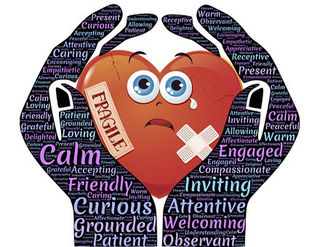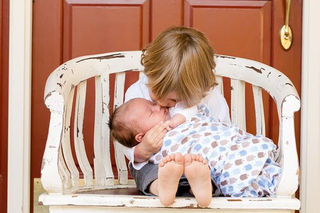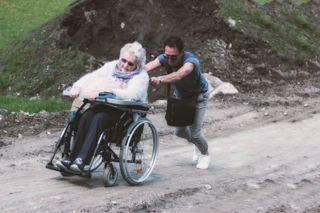Caregiving
52 Ways to Show I Love You: Caring and Caregiving
Providing care to a dependent, fragile, or person in need can show love.
Posted August 6, 2017

A friend recently arranged to have her husband’s heart condition treated at the Mayo Clinic, where she had located a guru known for his results in the surgical procedure her husband needed. She described pieces required to make arrangements — collecting medical records from six sources, securing her own hotel reservations nearly last minute, reserving flights that were filling fast. I knew that she, herself, had compromised lungs, so I asked if she had requested wheelchairs at the airports. Her husband would definitely need one on his return, so soon following surgery, but the stress of the trip to and from Minnesota — making their way through large airports,with security procedures on departure and baggage collection on arrival — promised to be daunting. She agreed to call Delta Disability Assistance and arrange for help. She wrote me to summarize her experience:
“Well, there is an Angel at Delta Disability and her name is SUE. Here is what this incredible woman accomplished, breezily….first, the wheelchair service up the wazzoo; second, we get to board with the kiddies; third: she rearranged our trip to include 2 new flights from Minneapolis to Rochester, and back! We had planned to take a shuttle service, but she dug up these flights that together were cheaper than the shuttle, and totally convenient for us. She modified our return flight back to LGA, and we get in a few minutes earlier. Fourth: she changed ALL OUR SEAT ASSIGNMENTS on the four flights, to put us near the front of the plane, with [her husband] on the aisle (bathroom access). Fifth: If it turns out we have to modify our return home, for medical reasons (always a possibility) I call her number, give the doctor’s name and phone number, and they rework our flight back. No penalty….THEN, she launched into all the things I can do in Rochester, while [he] is being poked and prodded….I am feeling so much better, and stronger.” (Quoted with permission from my friend.)
A need for care was announced and Angel Sue jumped in to provide it, assisting my friend who was already doing all that was in her power. Customer Care, yes, but Sue went well beyond to show Compassionate Love to a woman she had never met.
Twenty-one years earlier, an airline reservation person at Air France was responsible for changing my life. She helped David figure out how to get this woman he had met during a weekend (but had not yet kissed) back to his side of the Atlantic, to Paris. She eagerly worked with him (and her computer) to listen to and tend to his (romantic) needs. Unable to thank her in person at the time, twenty years later I dedicated my memoir about my transatlantic romance to that still anonymous woman.

We are born into this world dependent on others for our very survival, but also in order to thrive. Evolution has guaranteed that an attachment system, initially appearing as the bonding that takes place across so many species, is hard-wired into our capacities. We flourish under the attentions of a reliable other who meets our basic needs for food, shelter, safety and, as Harlow’s monkeys showed us so long ago, warmth and soft touch. We form attachment bonds to that caregiver. The attachment system has been described eloquently elsewhere in Psychology Today blogs – see Berit Brogaard or Melanie Greenberg on its chemistry. What is relevant for today’s topic is just how central caregiving is to attachment, how basic caregiving is to our human nature. We are genetically programmed to care for others in our tribe. Robert Sternberg identified caregiving as one of the three pillars in his triangular theory of love.
When should (or can) care be provided?
-
 Source: eberhardgross/Pixabay
Source: eberhardgross/PixabayWhen people are dependent — young, old, ill, disabled — they all need others to help with activities of daily living. The need may be as simple as brushing the hair of a loved one with a broken arm or as complicated as organizing 24/7 care for someone born with cerebral palsy.
- When a person is fragile. Perhaps a life event or genetic condition renders a person less able to take care of themselves than usual. A loved one mourning a death may need all sorts of help until he or she has restabilized, regaining equilibrium and endurance.
- When the person needs outside help. My friend headed for the Mayo Clinic needed help that Delta's Angel Sue provided. In the example of the man who today is my husband, he needed logistical support (caregiving) to organize a way to transform his idea of courting me into a reality. He found a sympathetic and understanding ear, a woman willing to listen to (and share) his story and the stumbling blocks he faced in moving it along. She helped him find ways around the challenges of logistics and geography. They found competent workers who, in their hearts, were also caregivers. The time and attention Sue spent enabling medical care or our Air France angel spent to facilitate a budding romance went well beyond any duty or random acts of kindness.

How do we act as a caregiver?
- Caregiving demands actions done with generosity. If the person helping out does not do so with an open heart, impatience and resentment inevitably show through, creating an additional burden for the person needing care as well as for the one providing it.
- Caregiving demands actions done with reliability. Only when a person can be counted on to take time to adjust the brace on a child with scoliosis or be sure that the lunches carried to school are appealing and free of allergens, can trust develop and the love behind the actions be felt. Only through reliability and trust can we come to believe that the person will be there when needed, to provide safety and solutions.
Why does caregiving express love?
- It shows that the welfare of someone else is a priority. By focusing on the comfort of the loved one, a person often delays his or her own pursuits and may even shift goals. This trade-off is universally understood: Look at the popularity of “It’s a Wonderful Life”, inspiring people to value the care they bring to one another each Christmas since 1946.
- It enhances one’s own self-respect as we and our loved ones come to trust our capacities to reach out, help, empathize, and act.
- Caregiving shows love by providing what is needed, whether physically, emotionally, socially, financially or logistically. It illustrates what Berveley Fehr, Susan Sprecher and Lynn Underwood illustrated in their book, The Science of Compassionate Love: Theory, Research and Applications. (John WIley, 2009).
When did you have a need that a loved one reached out to fill? How did that feel? Was your need ever filled resentfully? How did you respond? In what ways have receiving care - and providing it - helped you feel more loving and more loved?
Copyright 2017 Roni Beth Tower
Visit me at www.miracleatmidlife.com
References
B.Fehr, S.Sprecher, & L.G.Underwood. (2009) The Science of Compassionate Love: Theory, Research and Applications. (John Wiley).


